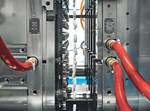Adaptive Injection Control Aids IML Molding
Getting back on cycle after frequent interruptions for mold cleaning.
In-mold labeling (IML) adds to the cost of rejects and thus puts premium value on consistent process control. German automotive injection molder KH Foliotec GmbH in Sparneck documented this value after retrofitting its KraussMaffei machines with the new adaptive process control (APC) system introduced by KraussMaffei (U.S. office in Florence, Ky.) at NPE2015 in Orlando (see our March ’15 show preview). The APC continuously modifies the injection/holding changeover point based on online measurement of the melt viscosity.
For example, KH Foliotec is molding a two-component radio bezel in a 1 +1 mold with a rotating plate. Transparent gray PC and then black PC/ABS are molded over a PC film with screen-printed black color coat and a scratch-resistant coating. The film’s high-gloss surface makes it necessary to clean the mold of particulates several times per shift. The APC reportedly accommodates these frequent process interruptions by producing good parts immediately after restarting. This significantly reduces rejects, and the standard deviation in part weight over 24 hr was cut from 0.16 g to 0.03 g with APC.
The molder recognized another benefit of the APC in IML production. The film acts as an insulator for the mold at 60 C (113 F), so that the back of the film is colder than the exposed areas of the mold. Hot plastic hitting the colder film tends to solidify faster, increasing the tendency to warpage. Increasing mold temperature is an undesirable solution because it could cause the screen-printed black coating to run and wash off during melt injection. APC, however, makes it possible to control warpage without raising mold temperature. Use of adaptive packing pressure is said to reduce stresses and avoid damage to the already frozen areas of the part.
Related Content
-
Automotive Awards Highlight ‘Firsts,’ Emerging Technologies
Annual SPE event recognizes sustainability as a major theme.
-
Impacts of Auto’s Switch to Sustainability
Of all the trends you can see at NPE2024, this one is BIG. Not only is the auto industry transitioning to electrification but there are concerted efforts to modify the materials used, especially polymers, for interior applications.
-
Carbon Fiber Reinforced Nylon 12 for Injection Molding
CRP Technology’s new composite is 100% recycled from Windform XT 2.0 IMG industrial 3D printing material.











